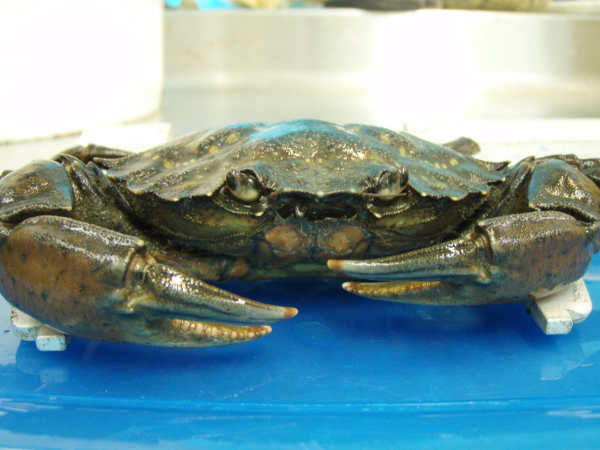
Catching European green crabs
Question: Are there any regulations regarding crabbing for European green crabs in the San Francisco Bay Area? I understand that they are an invasive species but could not find any more information on whether we can keep them. I would also like to know if they are safe to eat and if they are tested for domoic acid. (Toan H.)
Answer: There are no regulations that prohibit the take of European green crabs (Carcinus maenas). They would fall under California Code of Regulations Title 14, section 29.05, which covers general invertebrates, and gear restrictions for crustaceans, section 29.80. Please note that in San Francisco Bay, invertebrates may not be taken at night, except from the shore. The daily limit for general invertebrates is 35.
That said, European green crabs are not tested for domoic acid, so it's unknown whether they are safe to eat. The California Department of Public Health's Marine Biotoxin Monitoring Program only tests for commercial fisheries. Since there is no commercial fishery for European green crabs, there is no testing for this species.
Is it legal to take roadkill now?
Question: I read that California passed a law making it legal to take home a deer or other animal if you accidentally hit it with your vehicle. This makes a lot of sense since a large animal could feed an entire family, and might otherwise go to waste. But now I'm hearing that the California Department of Fish and Wildlife hasn't implemented the law yet. Which is it? (Bud)
Answer: Thank you for asking for clarification. SB 395, known as the Wildlife Traffic Safety Act, did indeed pass in 2019. The intent of the law is to eventually make it legal for individuals to utilize the meat of four wildlife species: deer, elk, wild pig, and pronghorn antelope, killed on the road, if they so choose. Unfortunately, there's been some misinformation circulating regarding what the law actually does, and when it goes into effect.
Specifically, the law authorizes the California Fish and Game Commission (not CDFW) to adopt regulations and establish a wild game meat utilization program after Jan. 1, 2020. This is a complicated process that will take time to implement responsibly. The program will be developed in conjunction with many other agencies, including the California Department of Transportation and the California Highway Patrol (both of whom will need to help develop the parameters of when and how roadkill could be collected) and the California Office of Environmental Health Hazard Assessment (which will need to evaluate potential safety hazards related to human consumption of roadkill).
There are other issues that still need to be worked out too, including the bill's directive to CDFW to create a roadkill reporting database. CDFW does not currently have such a database, but the University of California, Davis, has something similar. The California Roadkill Observation System is currently operational, and any citizen can contribute roadkill data and photos.
As previously mentioned, the ball is currently in the court of the Fish and Game Commission. CDFW will keep the public apprised as the development of the program moves forward, but at this time, there is no program in place, and therefore the option of taking your roadkill home remains off the table (so to speak).
Night vision scopes
Question: Are Californians allowed to own a night vision scope for non-hunting purposes? (Jackson)
Answer: Assuming you are referring to a scope used on a firearm, it is illegal to buy, sell, receive or be in possession of a sniperscope. A sniperscope is defined as any attachment or device designed for or adaptable to use on a firearm which, through the use of projected infrared light and an electronic telescope, allows the user to locate the presence of objects at night (California Penal Code, section 468). Possession of other types of night vision scopes (other than a sniperscope) is not prohibited.
In addition, it is unlawful to use or possess night vision equipment to assist in the taking of a bird, mammal, amphibian, reptile or fish (Fish and Game Code, section 2005).
Duck hunting over flooded fields?
Question: Can you hunt ducks over flooded corn? (Jackson)
Answer: Regulations about migratory birds are covered by both state and federal law. It's not illegal to hunt over standing crops that have been flooded or fields that were flooded after crops are harvested (California Code of Regulations Title14, section 509 and Code of Federal Regulations Title 50, part 20). There are some exceptions. Hunting waterfowl over a crop that has not been harvested but that has been manipulated (rolled/disked) is considered baiting under current regulations and therefore unlawful. The U.S. Fish and Wildlife Service has their own version of a Q&A to provide a more detailed answer to this question.
If you have a question for the California Department of Fish and Wildlife, email This email address is being protected from spambots. You need JavaScript enabled to view it.. While they cannot answer every question, they will answer a few in each column.

 How to resolve AdBlock issue?
How to resolve AdBlock issue? 





